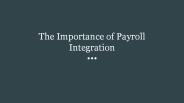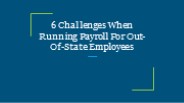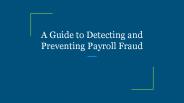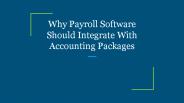Payroll Companies In Miami PowerPoint PPT Presentations
All Time
Recommended
All employers need to run payroll – even smaller businesses – but that doesn’t mean that it’s an easy process, and that you might not have a whole bunch of questions about how it works and what you need to do as an employer.
| PowerPoint PPT presentation | free to download
Choosing how often to pay your employees isn’t as simple as picking a schedule randomly; the payroll schedule you opt for can actually have a significant impact on your business and its cash flow, and careful consideration should be made before deciding.
| PowerPoint PPT presentation | free to download
What To Look For In A Quality Outsourced Payroll Service
| PowerPoint PPT presentation | free to download
As the owner of a small enterprise, you’ll probably know just how strictly regulated the legal system is with regards to many aspects of running a business, and this can prove especially complicated when dealing with the employee payroll accounts. There are myriad state and federal regulations with regards to pay, and ensuring that you comply with each of them can be a worry. Below are a few points that should set you going on the right path:
| PowerPoint PPT presentation | free to download
Salaries, bonuses and deductions (such as transit or health insurance) are the financial obligations paid by an employer to their workers, and these are covered by payroll.
| PowerPoint PPT presentation | free to download
There are millions of companies throughout the U.S. outsourcing their payroll, but why do so many businesses choose to do this, and how does it benefit them? Read on to know more about the benefits of outsourcing payroll and learn how it could help your company:
| PowerPoint PPT presentation | free to download
Your Outsourced Payroll Provider Checklist
| PowerPoint PPT presentation | free to download
The world of software is constantly changing for business owners, and selecting the right combination of payroll integration software to suit your needs, is crucial for the smooth running of your company.
| PowerPoint PPT presentation | free to download
In basic terms, a payroll system incorporates everything involved with the paying of employees and the filing of employment taxes. The number of hours worked must be tracked, wages must be calculated, taxes and other deductions must be withheld, pay checks printed and delivered to staff, and all appropriate taxes must be paid to the government.
| PowerPoint PPT presentation | free to download
Payroll is perhaps one of the most important elements of a successful business, as precious few companies exist without the help of a team of employees, and when they are not paid on time or their salary is not accurate, you stand a good chance of them either leaving their employ or threatening to take legal action against you.
| PowerPoint PPT presentation | free to download
Nowadays, businesses have been forced to evolve in order to become less decentralized and a lot more flexible, especially in light of the way in which the entire world is more connected now than ever before.
| PowerPoint PPT presentation | free to download
If you’re a new employer and aren’t familiar with all of the terms and taxes applicable to payroll, worry not, and definitely don’t panic.
| PowerPoint PPT presentation | free to download
Human resources departments within most companies are responsible for much more than simply processing payroll or handling the open enrolment season every year. Whether a business is large or small, human resources can play a large and often essential role in developing company strategy and handling all aspects of the employee-centred activities of an organisation.
| PowerPoint PPT presentation | free to download
Nowadays, businesses have been forced to evolve in order to become less decentralized and a lot more flexible, especially in light of the way in which the entire world is more connected now than ever before.
| PowerPoint PPT presentation | free to download
Payroll can be incredibly complex, even if you only employ a small number of people, and without professional intervention and assistance, mistakes can easily occur, and problems can quickly build up.
| PowerPoint PPT presentation | free to download
When compared to bigger companies, small businesses face a whole host of unique challenges, many of which they may not have the funds or resources to handle effectively in the same manner as a large business might.
| PowerPoint PPT presentation | free to download
Employees need to be paid, no matter how busy you are as the owner of a company, and no matter how many employees you may have. And as no business can function without them, ensuring that employees are paid accurately for the work they’ve carried out for you, and in a timely manner, is absolutely imperative.
| PowerPoint PPT presentation | free to download
Most industrialized nations had some form of bookkeeping in place which would have resembled at least in part, what we now refer to as payroll. As merchants and their products expanded over the years, bookkeeping and payroll had to improve to enable them to better keep track of their sales and outgoings.
| PowerPoint PPT presentation | free to download
As arguably one of the trickiest administrative functions of any organization, the tiniest and seemingly inconsequential of mistakes can take the whole payroll process down, and even force employees to work overtime to make the necessary corrections. When payroll mistakes go completely unnoticed on the other hand, you can enter into the dangerous territory of non-compliance, and even incur fines and costly legal action.
| PowerPoint PPT presentation | free to download
Penalties for late filing of taxes or incorrect payments are a common cause of concern among many businesses, particularly smaller companies who tend to prefer to tackle their payroll duties singlehandedly. This may work well for some business owners who have enough time to devote to payroll, but without specialist knowledge of the many state and federal rules, laws and regulations surrounding it, it can be easy to slip up and make costly errors. Business owners who choose not to outsource payroll, are still legally responsible for any cases of misrepresentation or failures to inaccurately report employment taxes to state and federal government agencies.
| PowerPoint PPT presentation | free to download
If you’re the owner of a small business, you’ll know just how important finances are in measuring your businesses success. Most financial considerations are kept within the company, and often strictly so, but payroll is one part of the business in which every company member has a vested interest. Often the biggest expense for companies, too, it’s vital that payroll be processed accurately and efficiently.
| PowerPoint PPT presentation | free to download
Back at the beginning of November - as you’ll doubtless already know - the bill language was unveiled for the much discussed and long awaited, federal tax reform. One important provision highlighted in the bill, would lower the pass-through rate for business income to 25%, leaving the top individual tax rate at 39.6%,
| PowerPoint PPT presentation | free to download
It’s an unfortunate reality that in many instances, payroll fraud isn’t detected, or even suspected, until large amounts of money have gone missing, and it can even take years for timesheet fraud or ghost employees to become apparent.
| PowerPoint PPT presentation | free to download
As a business owner, how often do you review your bonus and overtime pay programs? While these may be expected expenses, they are often the source of payroll leakage that unless examined regularly, can lead to a loss in revenue and productivity.
| PowerPoint PPT presentation | free to download
If you’re a small business owner with employees, hiring an outsourced payroll service is always going to be beneficial, regardless of how many people you actually employ. Not only does outsourcing relieve you of the burden of running payroll, but it also alleviates the stress of maintaining compliance, and filing state, federal and local taxes on time, and accurately.
| PowerPoint PPT presentation | free to download
Payroll is vital for the smooth running of any business, and is about so much more than calculating employee salaries – although that alone can be a daunting task depending on the size of your company. As such, many businesses seek help to make sure they get payroll right, and remain within the confines of the various tax and employee laws.
| PowerPoint PPT presentation | free to download
Naturally, as an employer it’s your responsibility to ensure that your employees are paid accurately and in a timely manner, irrespective of how many workers you have. You must be aware of all laws pertaining to payroll and stay up to date with the myriad changes to these laws that can occur throughout the year. You also need to understand payroll taxes and be sure to file accurately and on time to avoid costly penalties. For most employers, payroll can be a minefield and the sensible solution would seem to be that of hiring a payroll professional to help you get it right.
| PowerPoint PPT presentation | free to download
Mistakes made during the processing of payroll can be some of the costliest for a company, and when a business struggles to perform its own payroll duties due to lack of training, knowledge or experience, mistakes will almost certainly occur, some of which can result in a loss of finances, not to mention, credibility. One way straightforward and cost-effective solution to this is to outsource payroll to a professional company who will deal with everything efficiently and ensure that payroll is conducted within the confines of tax laws and other IRS requirements.
| PowerPoint PPT presentation | free to download
Have you just started your own business and are about to take on a set of employees, or perhaps you’re the owner of an established business but are struggling to keep on top of your payroll? Whichever applies to you, here is a short guide to choosing an online payroll service that will do everything you need it to:
| PowerPoint PPT presentation | free to download
The continuity plans of businesses large and small have been consistently challenged over the past 6 months, and with no definite end to the pandemic in sight, they remain a challenge. With more employees choosing (or being instructed) to work from home, business and their workers have been forced to rethink many of their duties and responsibilities, payroll included.
| PowerPoint PPT presentation | free to download
While the process itself may seem easy – you’ve just hired your first employee and you need to pay them – if you’re new to business and payroll, you may find that it’s not clear exactly what you should be doing and how to go about it. There may be many words and phrases that you’re not familiar with, such as ‘pay periods’, ‘unemployment tax’ and ‘Form 941’ to name but a few.
| PowerPoint PPT presentation | free to download
Even for businesses with only a handful employees, payroll is an essential function that must be kept on track at all times. However, payroll management is a huge task for smaller businesses, who without the right expertise and time, struggle to keep up to date with every crucial aspect of it.
| PowerPoint PPT presentation | free to download
When you're a small business owner, you know that payroll is one of the most important things you have to handle. It's not just about paying your employees and ensuring they receive their wages; it's also about having accurate records for tax purposes. The last thing you want to do is pay an employee incorrectly or miss out on paying them altogether.
| PowerPoint PPT presentation | free to download
Running a small business can provide great financial comfort in times of economic hardship - even more so if it’s a success - but it also requires a lot of dedication, hard work, time, and maintenance. Even small businesses have employees to pay, accounts to balance and financial decisions to make that can impact its very success, and every overhead cost has to be counted and justified.
| PowerPoint PPT presentation | free to download
Every business owner must start somewhere, and even if you have grown up around business owners or your family runs a business that you are involved in, going it alone can be a whole different kettle of fish. While it’s highly advisable that new business owners seek professional help and guidance when setting up their company and preparing to take on and pay a workforce, there are a few basics that it can be helpful to understand before you begin intake proceedings.
| PowerPoint PPT presentation | free to download
It’s no secret that payroll compliance requirements can be complicated, and that managing payroll using an in-house team can be demanding at the best of times. Even for businesses with a smaller workforce, payroll must still be accurate, and always processed in a timely and efficient manner; get it wrong and your employees will soon let you know about it!
| PowerPoint PPT presentation | free to download
Home cleaning services, as the name suggests centered on cleaning different types of homes like apartments, condos, single family homes etc. The basic services include cleaning floors, toilets, baths and kitchen.
| PowerPoint PPT presentation | free to download
More and more businesses are being forced to close temporarily, or have their employees work from home due to the current health crisis. There are fraudulent scams and phishing emails to watch out for, not to mention employee uncertainty and having to strictly adhere to the FLSA (Fair Labor Standards Act). The ‘Families First Coronavirus Response Act’ has also been introduced on March 18th, and all these things combined have created a lot of pressure on payroll departments all over the country.
| PowerPoint PPT presentation | free to download
In days of old, payroll involved a whole lot of manual calculations on ledgers and employees were all paid in cash. Gradually, as time progressed, pay checks were introduced and workers often waited up to a month to receive their pay. Then, when federal withholding taxes made their merry way into the equation, things got a whole lot more complicated.
| PowerPoint PPT presentation | free to download
Interfuse Staffing is a trusted manufacturing staffing service firm in Miami, Florida. We are a specialized agency that focuses on providing staffing solutions for companies in the manufacturing industry. Our firms play a crucial role in helping manufacturing companies find qualified and skilled personnel to meet their workforce needs.
| PowerPoint PPT presentation | free to download
Interfuse Staffing is a trusted manufacturing staffing firm in Miami, Florida. We are a specialized agency that focuses on providing staffing solutions for companies in the manufacturing industry. Our firms play a crucial role in helping manufacturing companies find qualified and skilled personnel to meet their workforce needs.
| PowerPoint PPT presentation | free to download
The short answer to this question will always be a definitive, yes, but let’s look at the benefits of outsourcing payroll in a little more detail, and as a small business owner, you can make an informed decision as to whether you should choose to outsource this vital element of your company:
| PowerPoint PPT presentation | free to download
Small businesses are said to employ almost half of all workers in the U.S. and if you run a business with employees, then your payroll is likely to be a little different this year; here are the top 10 changes to payroll for 2019:
| PowerPoint PPT presentation | free to download
While it can be easy to look at outsourcing payroll duties as an extra expense you could do without, this is a rather simplistic way of viewing it, and does nothing to explore or explain the amount of money that a small business can save in the long term if payroll is outsourced. In fact, when you examine outsourcing in closer detail – in particular, payroll – many of the direct costs associated with processing payroll internally, can be massively reduced when working with an outside provider. Let’s look at this in closer detail:
| PowerPoint PPT presentation | free to download
As a business owner or manager, it can be tiresome to have to enter employee salary details into the payroll software, and then manually enter it into the accounting system, too. Without integration between the different software, this will always be a thankless and time-consuming task. In duplicating data from the payroll software to your general ledger, aside from it being a lengthy task, there is also ample room for error, and as all good business owners and managers should know, errors can cost a company more than just money.
| PowerPoint PPT presentation | free to download
First make a priority list as to what type of cleaning is required and then start putting it into practice. Office cleaning in Miami does not involve removing dirt and dust alone, it also implies improving the indoor air quality. Proper ventilation and removal of toxics can ensure that your employees do not avail sick leave often.
| PowerPoint PPT presentation | free to download
With the impact of the global health pandemic being felt by thousands of industries the world over, many companies have faced operational and financial challenges, the likes of which they have never experienced before. Desperately searching for ways to deal with these challenges while continuing to meet the needs of their customers, clients and employees, has been tough for them, and decisions have had to be made with respect to cutting costs wherever possible.
| PowerPoint PPT presentation | free to download
Non-core functions are classed as activities that are not chargeable to your customers, and which do not affect your competitiveness with other businesses. A prime example of a non-core function would be payroll.
| PowerPoint PPT presentation | free to download
Both time consuming and complex, payroll for employees is the bane of many a small business owners’ life, yet as a necessity, it has to be dealt with one way or the other. Fortunately, there are a number of ways in which you can simplify payroll, while still ensuring that your employees are paid; read on to know more:
| PowerPoint PPT presentation | free to download
If you’re the owner of a small business, you’ll know that there are many roles to be fulfilled, and you may have been tempted to take all of them on, yourself. That may even prove workable if your company is very small and you have no employees, but the minute you take on a workforce – even if it’s only one or two individuals – you’ll need to ensure that payroll is completed accurately and in a timely manner, and this can be difficult to focus on if you’re running every other aspect of your business, too.
| PowerPoint PPT presentation | free to download
Payroll still is, and quite possibly always will be, an integral part of many businesses, especially if they have employees to pay salaries to, and taxes to withhold. However important they remain though, there are always new regulations to abide by, payroll software updates and changing tax codes, meaning that it’s important to stay on top of what’s new in the world of payroll. Mistakes can prove costly and the responsibility placed on payroll professionals, is a big one.
| PowerPoint PPT presentation | free to download
Keeping up to date on federal and state policy issues and laws with respect to Human Resources and payroll, is a constant, ongoing task for HR professionals, and many small businesses outsource this element of their operations to ensure that they’re always compliant.
| PowerPoint PPT presentation | free to download
As the owner of a business, it is your responsibility to make sure that payroll runs smoothly and efficiently, for your sake, that of your business and of course, your employees.
| PowerPoint PPT presentation | free to download
Employees who arrive late, take longer than permitted for their lunch breaks or slip out of work early, can cost your business dearly, with up to 20 hours of productivity being lost in some cases. So, what can you and your business do to help prevent this and get back all those lost hours? The solution is to make your employees more accountable by implementing an effective time and attendance management system.
| PowerPoint PPT presentation | free to download
If you’re in the process of starting up your own business and are ready to take on employees, here are a few of the most basic payroll pointers to get you started. For more detailed information, you should seek advice from a professional company offering specialized payroll services.
| PowerPoint PPT presentation | free to download
People have been paid for the services they offer and the jobs they complete for as long as humans have been in existence, and the concept of recording and tracking payroll is by no means a modern one. The way in which this is done has naturally evolved as businesses have, and payroll is now largely computerised and high tech. The laws regarding payroll have also evolved over time, and now more than ever, it’s vital that you remain payroll compliant to avoid costly penalties and disgruntled employees.
| PowerPoint PPT presentation | free to download
























































